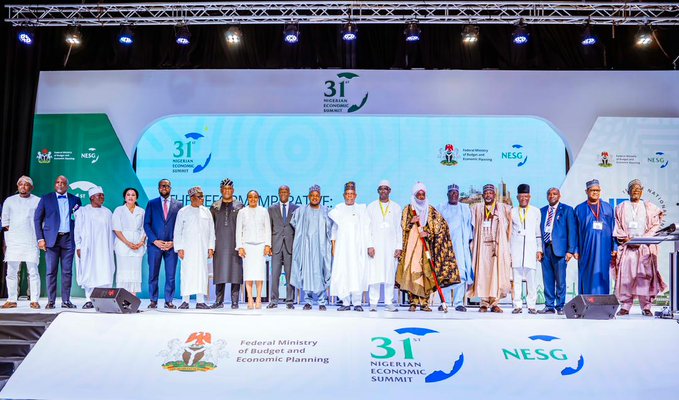President Bola Tinubu on Monday opened the 31st Nigerian Economic Summit (NES1) in Abuja, where he explained the rationale behind his administration’s establishment of the ₦200 billion intervention fund for micro, small, and medium enterprises (MSMEs) and manufacturers.
Represented by Vice President Kashim Shettima, Tinubu stated that the fund was a necessary measure to help these critical sectors boost competitiveness and overcome structural challenges.
“We established a ₦200 billion intervention fund to support micro, small, and medium enterprises and manufacturers, helping them overcome structural challenges and enhance competitiveness,” the President said.
READ ALSO: Tinubu support for Kano will be reciprocated in 2027, says Deputy Senate President Barau
He reiterated his government’s resolve to address the plight of poor, unemployed, and vulnerable citizens by creating pathways for young Nigerians to access loans, grants, and equity investments of up to $100,000 to scale their businesses.
Tinubu asserted that the economic reforms initiated by his administration were yielding tangible results across all sectors, surpassing projections from both multilateral agencies and local economic experts.
He noted that the administration’s decisions were “guided by the pursuit of balance between economic logic and public expectation.”
The President highlighted several key economic indicators in his address. He stated that the nation recorded a Gross Domestic Product (GDP) growth rate of 4.23% in September 2025.
According to him, the economy expanded to ₦372.8 trillion in 2024, up from ₦309.5 trillion in 2023.
He further noted that total revenue collection increased from ₦19.9 trillion in 2023 to ₦25.2 trillion in 2024, and rose further to ₦27.8 trillion as of August 2025, surpassing the ₦18.32 trillion target.
In addition, the President revealed that the debt service-to-revenue ratio had dropped significantly from 97% to less than 50%, while the debt-to-GDP ratio stood at 38.8%, well below the statutory limit of 60%.
He credited the significant progress in stabilising the economy and public finances to the patience and sacrifices of Nigerians.
He stated that the stability in the foreign exchange market, alongside the removal of the fuel subsidy, reflected “deliberate choices guided by the same economic wisdom that gatherings such as this embody.”
The President added that the country’s improved economic foresight and clearer policy direction had led to a credit rating upgrade by Fitch to ‘B’ with a stable outlook, and by Moody’s to ‘B3’ with a stable outlook.
Furthermore, non-oil revenues saw a significant 411% year-on-year growth in August 2025 with the tax-to-GDP ratio now at 13.5%, an increase from “barely 7% a few years ago.”
Tinubu also explained that the increased monthly federal allocations to states were intended to empower each federating unit with the resources and autonomy needed for development.
He assured that the four Tax Reform Acts recently signed into law would simplify compliance, reduce dependence on oil, and protect low-income earners, thereby laying the foundation for a “fairer and more prosperous Nigeria.”
In his remarks, the Chairman of the Nigerian Economic Summit Group (NESG), Olaniyi Yusuf, advised the government to prioritise security as a critical enabler of reforms, emphasising that reforms cannot take root without peace.
Boye Olusanya, Vice Chairman of NESG, while commending the strategic reforms like the foreign exchange market stabilisation and fuel subsidy removal, cautioned that these measures, though critical, were “largely insufficient in addressing overarching issues in the polity,” and warned against any reversal of key policy decisions.
READ ALSO: Tinubu concludes ten-day working trip to Lagos, returns to Abuja
Other dignitaries present included the Coordinating Minister of Finance and the Economy, Wale Edun, and other Ministers.
The summit, themed “The Reform Imperative: Building a Prosperous and Inclusive Nigeria by 2030,” brings together public and private sector stakeholders.



